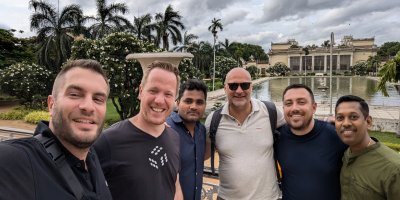At the start of the 21st century, Planon’s rapid growth created challenges in sourcing enough software developers. Large organisations with high-profile projects often attracted talent, making it difficult for a smaller facility management software company from the Nijmegen region in the Netherlands to compete. To address this, the company decided to expand its software development department internationally, establishing a presence in India.
In 2008, Planon opened its India office in Hyderabad. Today, the India team comprises approximately 250 employees, with over half working in the software development department. This expansion greatly boosted Planon’s capabilities, but it also introduced the challenges and opportunities of intercultural teamwork between India and the Netherlands.
Fostering collaboration across borders
From the outset, Planon recognised the importance of building mutual understanding between employees in the Netherlands and India. Training sessions were organised to address cultural nuances. Dutch colleagues were educated on topics like navigating cultural hierarchies, while Indian colleagues were introduced to the Dutch preference for directness in communication. Investments were made in travel, allowing team members from India to spend time in the Netherlands and build meaningful connections.
From the get-go, Planon ensured that intercultural teams remained connected through extended virtual meetings, but the company still values face-to-face interactions as key to fostering trust and understanding.
Navigating cultural differences
English is the primary language at Planon, including within our software development department. This decision is not only influenced by the collaboration between India and the Netherlands, but also by Planon’s international nature, with a diverse range of nationalities represented across the software development teams within the Planon Group. Despite using a common language, communication styles represent a key cultural distinction between the two countries. For instance, feedback delivery can differ: Dutch professionals typically value directness, while Indian professionals often approach feedback with greater sensitivity to interpersonal dynamics. As Planon India grew, Dutch and Indian employees adapted to these differences, with many team members gaining experience in direct or indirect feedback practices. Furthermore, a cultural shift within India is encouraging younger generations to embrace open communication and question traditional hierarchies.
Despite these cultural differences, Planon maintains a balanced blend of cultural influences. Instead of one culture overshadowing the other, most teams are evenly split between colleagues based in India and the Netherlands, fostering a sense of mutual dependence. This is also where Planon’s India-Netherlands collaboration stands apart from traditional offshoring. Unlike the typical model, where all software development activities are outsourced to India, Planon takes a more integrated approach. Equal representation of Dutch and Indian colleagues at all levels of the software development department - from new hires to senior leaders - reflects the balance and mutual reliance between the two countries, with both playing an active role in shaping every solution.
Bridging gaps and driving growth
For new employees, working within an intercultural team may initially feel unfamiliar. To help them, Planon provides coaching, assigns experienced mentors, and encourages daily team stand-ups. Local managers usually handle junior-level people management to ensure cultural alignment, while senior professionals are often better equipped to manage cross-border teams effectively.
Time zone differences between the two countries present logistical challenges but are effectively managed through flexible scheduling. Teams coordinate meetings to respect different workday rhythms, and some employees adjust their schedules to better align with their colleagues. The time zone differences also benefit the organisation’s ability to serve clients in the Asia-Pacific region.
Embracing diversity as a strength
Intercultural teamwork has brought numerous advantages to Planon, not only within the software development department. With offices in 16 countries and a workforce representing approximately 50 nationalities, the company’s global presence and diversity brings a wide range of perspectives, encouraging our colleagues to be more flexible and open while reducing unconscious bias. By embracing the cultural diversity of its international workforce, Planon continues to foster a dynamic and inclusive workplace.
A key part of Planon’s company culture is celebrating achievements - big and small - across all offices. These shared moments of recognition keep the team spirit alive and strengthen the company’s focus on collaboration. By valuing diverse perspectives and addressing challenges constructively, Planon has created a workplace that radiates intercultural collaboration, enabling the company to grow and innovate on a global scale.

